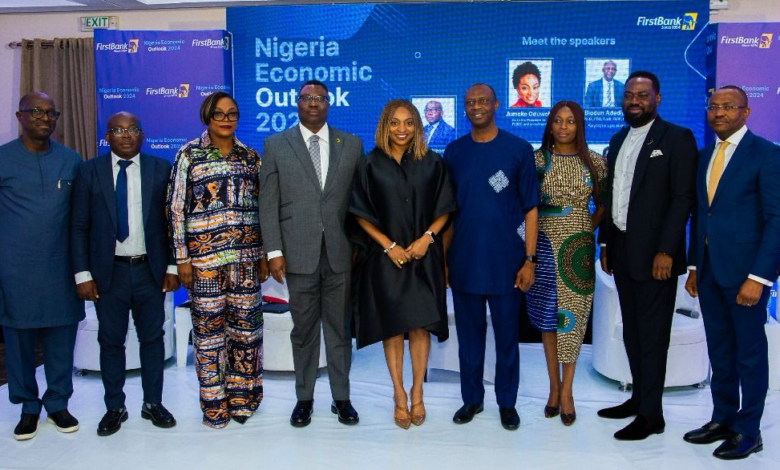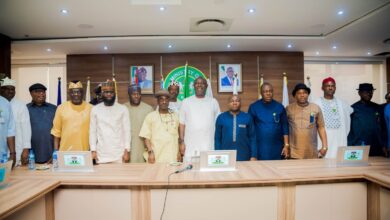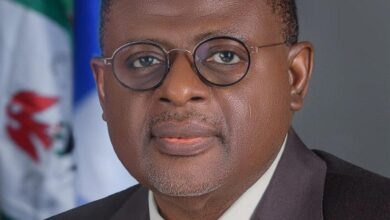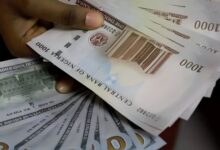Marine & Blue Economy, N9.9tr Allocation for Infrastructure, Others to Drive Growth in 2024

Executive Director, Retail Banking South, FirstBank, Oluseyi Oyefeso (left); Head, Strategy & Corporate Development, Chike Uzoma; Group Executive, Transaction Banking, Olaitan Martins; Executive Director, Corporate Banking, Tosin Adewuyi; Special Assistant to the President on PEBEC and Investment, Jumoke Oduwole; Founder and Chief Consultant, B. Adedipe Associates Limited (BAA Consult), Dr. ‘Biodun Adedipe; Group Head, Marketing & Corporate Communications, FirstBank, Folake Ani-Mumuney; Founder, The FactBox Company and Leadership-By-Data, Babajide Ogunsanwo and Executive Director, Investment Management and Oversight, FBNHoldings, Oyewale Ariyibi, at the FirstBank Nigeria Economic Outlook 2024 in Lagos
Policy and data analysts, as well as economic experts have declared that the creation of the Marine and Blue Economy Ministry and the allocation of N9.99 trillion for capital expenditure and infrastructure development in the 2024 Budget will be major drivers of growth in fiscal 2024.
They also posited that Nigeria’s large population of 223.8 million comprising mostly youth of an average age of 17.2 years and the sixth largest populace in the world presents a positive outlook for the nation’s economy since a youthful and vibrant population is capable of buying and consuming anything.
Speaking at FirstBank of Nigeria’s Economic Outlook 2024: Current Realities and Prospects, the pundits argued that President Bola Ahmed Tinubu’s policy thrust in critical sectors as captured in the 2024 budget point to a positive outlook for the nation’s economy in the year.
Chief Executive Officer of Biodun Adedipe and Associates (BAA Consult), Dr. ‘Biodun Adedipe, who presented the keynote address at the summit, said the creation of the Ministry of Marine and Blue Economy and allocation of N9.99 trillion for capital expenditure (infrastructure development) represent a positive outlook for the nation’s economy.
He said the way President Tibunu has handled national issues since assuming office shows that he listens to people’s opinions and that given that disposition, Nigerians should continue to speak up for the government of the day to take more proactive steps in moving the nation forward.
“The President knows the value of money in a sustainable economy and he is poised to look for the money in all the critical sectors and one of his strategies is to appoint experienced and competent people into such key sectors to deliver on his administration’s mandate. Another area of strength is the Federal Government’s focus on capital expenditure last seen in the 1980s,” he said.
In his overview of the 2024 budget, he stressed that other interesting indices for positive economic outlook are rapid urbanisation at 51.96 percent in 2020 and 53.96 percent in June 2023, up from 47.84 percent in 2015 and deepening internet penetration at 45.57 percent in August 2023, rising from 31.48 percent in December 2018.
“The nation’s teledensity at 116.6 percent in December 2022 and 115.63 percent in August 2023, a drop from 123.48 percent in December 2018 (91 percent in March 2019) and Internet users for which Nigeria ranks 11th globally are also good pointers to a better and resilient economy projected to grow at 3.5 percent this year.
“On exchange and interest rates, the Federal Government benchmarked the budget assumption at N800/$; significant utterance N650-N750/$, while JP Morgan pegged it at N850/$. The Monetary Policy Rate (MPR) of 18.75 percent is expected to be raised to reduce negative interest rate by closing the domestic inflationary gap of 26.72 percent and respond to rate differentials with dollar interest of 4.58 percent yield on 10-year treasury bonds and inflation of 3.7 percent,” he said.
He further explained that money supply and imports have maintained a relentless uptick on inflation rate, while local oil refining, revived manufacturing and focused export promotion will support stability to the Naira exchange rate, just as improvement in infrastructure would begin to positively impact the cost of doing business.
Adedipe, who urged the Federal Government to create a friendlier business environment for more businesses to thrive, pointed out that Switzerland, Japan, Germany and other countries have been making enquiries on investment opportunities in the Nigerian economy in 2024 and beyond.
He stressed that the government should strive to attract and retain manufacturers, adding that big manufacturing companies like GSK, P&G and Nestle, among others exiting in recent times, was not about Nigeria, but they were doing so to align with their global business strategies.
“Most of the companies exiting Nigeria are still producing and shipping to countries from which they exit, but still export from. It is global shift of international trade post-COVID 19 pandemic. But essentially, China, India and Lebanon are dominant countries in terms of trade with Nigeria,” he added.
Speaking during the panel session, Founder of FactBox Company and Leadership-By-Data, Babajide Ogunsanwo, who said security remains crucial to agriculture and food production, lamented that across the 45 sectors of the economy, crop production was growing at only 1.65 percent, while post-harvest losses in the country was still high at 60 percent.
He said the Federal Government should leverage the country’s youthful population and ensure availability and affordability of food by engaging in all-year faming, as well as provide facilities for improved processing, storage and preservation of farm produce with a view to attaining a sustained agricultural production and entire food chain.






